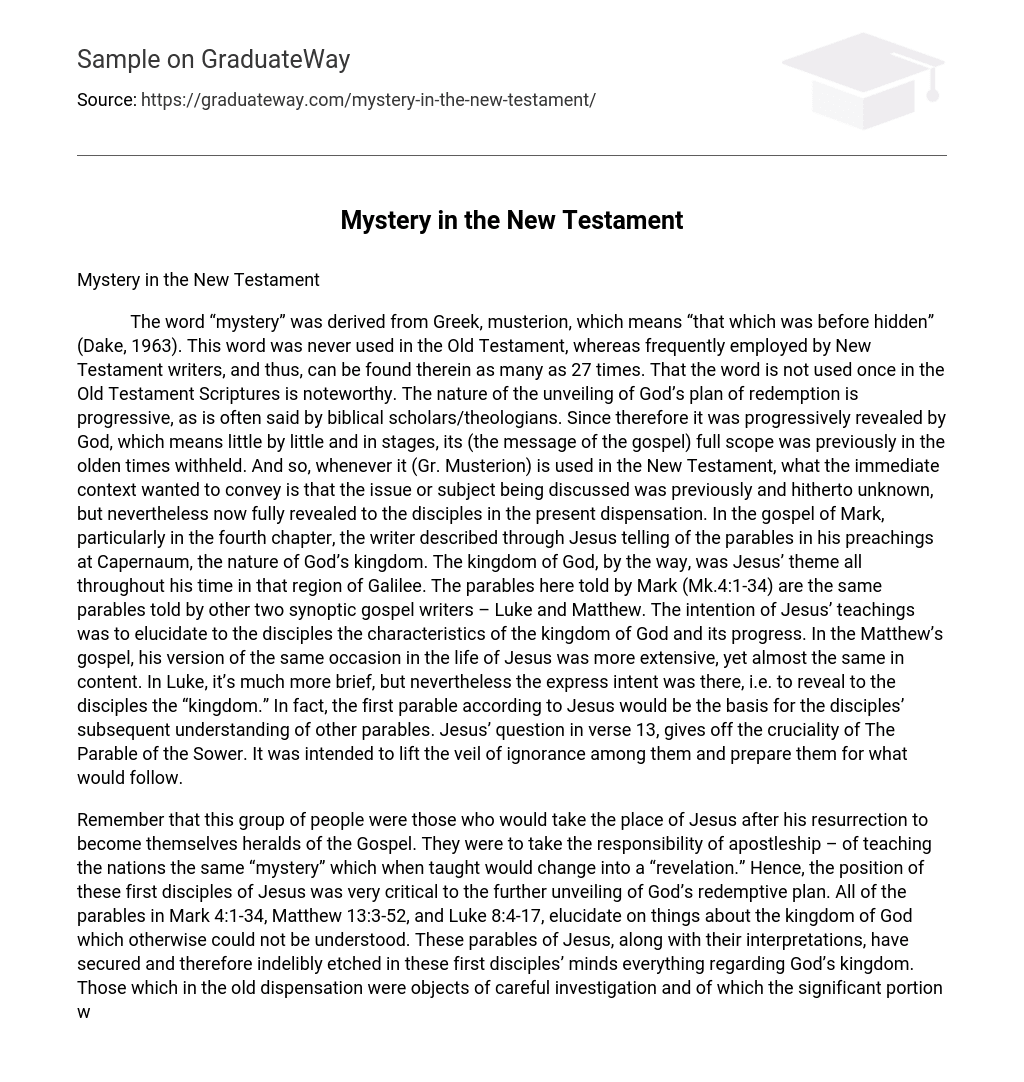The word “mystery” was derived from Greek, musterion, which means “that which was before hidden” (Dake, 1963). This word was never used in the Old Testament, whereas frequently employed by New Testament writers, and thus, can be found therein as many as 27 times. That the word is not used once in the Old Testament Scriptures is noteworthy. The nature of the unveiling of God’s plan of redemption is progressive, as is often said by biblical scholars/theologians. Since therefore it was progressively revealed by God, which means little by little and in stages, its (the message of the gospel) full scope was previously in the olden times withheld. And so, whenever it (Gr. Musterion) is used in the New Testament, what the immediate context wanted to convey is that the issue or subject being discussed was previously and hitherto unknown, but nevertheless now fully revealed to the disciples in the present dispensation. In the gospel of Mark, particularly in the fourth chapter, the writer described through Jesus telling of the parables in his preachings at Capernaum, the nature of God’s kingdom. The kingdom of God, by the way, was Jesus’ theme all throughout his time in that region of Galilee. The parables here told by Mark (Mk.4:1-34) are the same parables told by other two synoptic gospel writers – Luke and Matthew. The intention of Jesus’ teachings was to elucidate to the disciples the characteristics of the kingdom of God and its progress. In the Matthew’s gospel, his version of the same occasion in the life of Jesus was more extensive, yet almost the same in content. In Luke, it’s much more brief, but nevertheless the express intent was there, i.e. to reveal to the disciples the “kingdom.” In fact, the first parable according to Jesus would be the basis for the disciples’ subsequent understanding of other parables. Jesus’ question in verse 13, gives off the cruciality of The Parable of the Sower. It was intended to lift the veil of ignorance among them and prepare them for what would follow.
Remember that this group of people were those who would take the place of Jesus after his resurrection to become themselves heralds of the Gospel. They were to take the responsibility of apostleship – of teaching the nations the same “mystery” which when taught would change into a “revelation.” Hence, the position of these first disciples of Jesus was very critical to the further unveiling of God’s redemptive plan. All of the parables in Mark 4:1-34, Matthew 13:3-52, and Luke 8:4-17, elucidate on things about the kingdom of God which otherwise could not be understood. These parables of Jesus, along with their interpretations, have secured and therefore indelibly etched in these first disciples’ minds everything regarding God’s kingdom. Those which in the old dispensation were objects of careful investigation and of which the significant portion was still veiled, had become plain and clear to the apostles who wrote the New Testament (1 Pet.1:10-12).
The coming of Jesus in the flesh was a critical point in the redemptive history. It was an event to which all the previous outworking of history – which involved the calling of certain individuals, the forming of the nation of Israel and the rising of empires – eventually led. And so, the presence of Jesus in Galilee, the hostile attitude of the people of Israel at large (most specially its leaders, the Pharisees), and the spiritual blindness that characterized Israel which made her resistant to the truths in the person of the Messiah during this time, and the careful explanation of Jesus to his disciples about the nature of the kingdom of God, as narrated by Mark in chapter four of his gospel, were all vital to the outworking of God’s salvation. Things which were considered “mysterious” up to this time were also made known by Jesus to his chosen disciples. Proofs of how deep and how far have these disciples had gone in the teachings of Jesus are the writings which left for us in the New Testament.
References:
1. Dake, Finis Jennings. 1963. Dake’s Annotated Reference Bible. Dake Bible Sales, Inc. P.O. Box 1050, Lawrenceville, Georgia 30246.
2. The Holy Bible, New King James Version. 1982. Thomas Nelson Inc.





